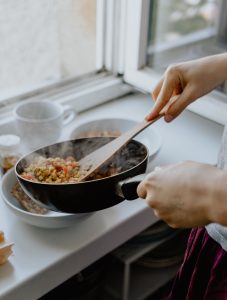Community responses to coronavirus: guidance for good practice
Thousands of people in communities throughout Scotland have volunteered to ensure those who are most vulnerable have the support they need during the coronavirus (COVID-19) emergency. Meanwhile, existing community food initiatives – food banks, community cafes, growing projects – are working tirelessly to adapt their services to fit within new government and health guidance and keep their staff and volunteers safe.
We encourage everyone to follow the latest government guidance on staying safe and protecting others
As Scotland’s communities quickly adapt existing initiatives and develop new forms of food provision, there is a risk that we will forget an important lesson – responses to food insecurity can either enhance or undermine a person’s sense of dignity and overall wellbeing. This is no time to forget what we have learned about the principles of good practice.
Dignity Principles in Practice – adapted for COVID-19 emergency
Though the context for community food work has changed dramatically with the coronavirus (COVID-19) outbreak, it is more important than ever that dignity is at the heart of our response to food insecurity. The Dignity Principles in Practice were developed to help community food providers review and improve their service with a focus on promoting and enhancing dignity for those experiencing food insecurity. They provide invaluable guidance at this exceptional time.
Dignity means feeling…
- a sense of control
- able to take part in community life
- nourished and supported
- involved in decision-making
- valued and able to contribute
Feeling a sense of control

Choice about where and with whom people eat has become very restricted, and we know that being stripped of agency and control can wear away at a person’s sense of dignity and wellbeing. Feeling in control over what and how to eat will be an important part of any response.
Community responses can:
- Prioritise choice and control in the design of food support programmes, including through cash grants to purchase food directly.
- Be mindful of meeting dietary requirements and preferences that will support or further risk people’s overall health and wellbeing.
- Refer people to government and council websites that are being updated with information about people can access financial entitlements and support.
Feeling able to take part in community life
Many of us will feel significant constraints on being able to take part in community life during this time – this sudden change may be felt even more deeply by people who struggle to use or access technology. Digital inclusion is an important part of making sure people stay connected to each other, but even a phone call or letter can make a big difference.
Although sharing and preparing food together in the community has been put on hold, the social value of food remains important. Now is the time to be creative about what community looks like.
Community responses can:
- Ensure that social connection is a key part of food support programmes, while following proper guidance about how to provide essential support safely to those who cannot leave the house
- Ask people about the best way to get in touch with them
- Text, email, phone, Facebook messages, FaceTime, Skype or letters are all safe options.
- Check in with each other on a regular basis to offer support and encouragement.
- Be creative about ways that food can still bring people ‘together’
- Share a cup of tea on video chat
- Swap recipes with friends and family
- Post photos of cooking and baking projects to on WhatsApp or Facebook
Feeling nourished and supported

Worrying about having enough food to eat – or having to make compromises in the variety and quality of food you can access – can wear away at a person’s sense of dignity and overall wellbeing. Food insecurity experienced in the medium to long-term is closely associated with poor mental and physical health.
Community food initiatives are often about more than just food. As spaces to gather around the table are restricted, it is essential to find ways to maintain the wider role community groups play – reducing social isolation, building relationships and supporting people to live active and healthy lives.
Community responses can:
- Support people to access a wide variety of healthy foods that will keep them well, taking into consideration special dietary requirements and restrictions
- Arrange for home delivery of groceries, or support them to set up online shopping
- Offer to pick up shopping for someone who cannot leave the house, if you are going out anyway
- Help people to access financial advice and support when they need it
- Money, debt and benefits advice is available through Citizens Advice Scotland and on the Scottish Government’s website
- Information about additional support in your area is also available online
- Follow up-to-date guidance on safe ways to support neighbours, friends and family who cannot leave the house
- Developing small teams of people who can look out for each other’s needs if one of them needs to self-isolate will mean people don’t get overstretched
Feeling involved in decision-making
It is important to involve people who will be needing new support and provision in decisions about the design. Once services are in place, involving those receiving support in regular reviews and changes will embed dignity into the delivery.
Older people who are suddenly restricted from volunteering in the community food sector – which is heavily dependent on their support – are well-placed to provide important insights about what support they and others in their situation will need.
Community responses can:
- Ask people who need support what they want and need to keep them safe and well
- Take these views seriously as new services are designed or reframed for the new context, even if it means a different way of working
- Establish methods of regular feedback and review with people to ensure the work continues to support and promote people’s dignity as the situation evolves
- Involve existing volunteers who have been asked to self-isolate in designing and delivering the service in a new way
Feeling valued and able to contribute

Many people who need support during this crisis are used to being active members of their community – working in jobs, caring for their friends and family and volunteering. Becoming someone who needs help, rather than someone who provide support to others, can feel undermining and unsettling.
Be mindful of the many different skills and experiences that people can offer, even under new circumstances.
Community responses can:
- Speak to volunteers who usually come together through community food initiatives about other skills and experience they can offer beyond their previous role
- Be encouraging and supportive of those who need to self-isolate and stay at home – it is helping everyone in society to follow health guidelines
- Ensure that support efforts include time and ways for staff and volunteers to get to know the people they are supporting – making sure those being supported feel valued as individuals
- Explore ways that those receiving support can offer something back to the community, whether financial or otherwise
- Supporting people who are able to pay for groceries and other support while they are staying at home may help them feel more independent
- Providing mobile phone credit / top-ups may help people who are struggling financially to offer critical support and encouragement to their own networks of friends and family
This guidance was developed in partnership with members of the Dignity Peer Network and a group of volunteers with lived experience of food insecurity. (Updated 14.8.20)